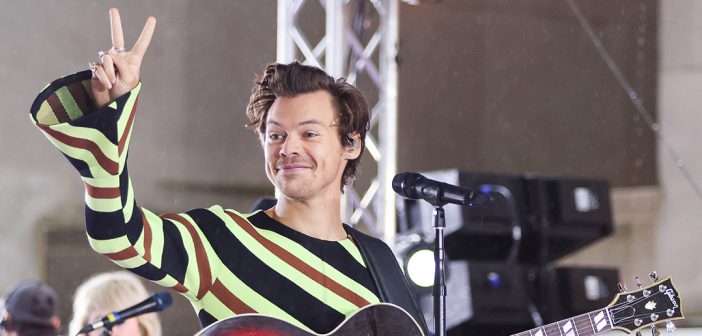Fordham alumnus Louie Dean Valencia made a splash on Twitter for announcing that he’ll be teaching a university class on Harry Styles—the first of its kind. On Oct. 12, the Fordham grad—dubbed “The Harry Styles professor”—returned to campus to present a lecture titled “Harry Styles vs. Intolerance: How to Make Authentic, Inclusive, Avant-Garde, and Joyful Spaces.”
Valencia, an associate professor of digital history at Texas State University, earned his doctorate in history from Fordham’s Graduate School of Art and Sciences in 2016. An expert on fascism and its effects on popular culture in Franco’s Spain, Valencia said he came to the subject matter of Harry Styles during the pandemic, when his ability to do research in Europe was curtailed.
He said that after years of studying fascism, he wanted to shift the focus to something more enjoyable at a time of isolation. Styles, a superstar known in part for a genderfluid wardrobe that includes boas and pearls, got his start in the boy band One Direction. After striking out on his own, he has become one of the biggest acts in the world. He is currently starring in two films, and this past summer he sold out Madison Square Garden for a record-breaking 15 consecutive shows dubbed “Love on Tour.” Valencia said the tour embodied the title of Styles’ latest album, Harry’s House, by creating a welcoming space that often spilled over onto social media. Several students attending the lecture saw the MSG show, as did Valencia, who has also traveled to Europe to see the performer as part of his research.
He said that while focusing on Styles’ work was far more enjoyable than examining fascism, he grew to see a corollary to his work on anti-fascist artists in Franco’s Spain.
“The more I thought of it, the more I realized that Harry is the epitome of anti-fascism,” said Valencia in his lecture in the McNally Amphitheatre at the Lincoln Center campus. “He’s teaching people to be anti-racist and how to create queer spaces.”
He said that the concept solidified when Styles appeared in a dress for Vogue, and a conservative backlash “exploded” on the internet.
Inspiring Important Conversations
He soon realized that it didn’t matter whether Styles was explicitly trying to be anti-fascist, the reaction from the far right indicated that his actions qualified as anti-fascist. But several paparazzi photos of Styles carrying books by philosophers Susan Sontag and Alain de Botton indicated that it is unlikely that Styles is ignorant of the effect he’s having on conversations surrounding gun violence, queer identities, Black Lives Matter, and bodily autonomy, he said.
Indeed, many of those conversations took place with Valencia’s students on Zoom during the pandemic, when Valencia would play Styles’ music before class convened. It wasn’t much of a stretch for the professor to launch a conversation dealing with a historic subject by referencing the music and its singer.
“We had awesome conversations coming out of Harry Styles’ music, and I was like, this is really good to be able to think about how to talk about these issues today. And I’m a history professor, right? So, I thought okay, I love this new history.’”
He noted that when he was in college, most of the history classes culminated with the fall of the Berlin Wall or 9/11, which made him begin to question what a similar perspective might be for his students today. With history classes ranging from the Middle Ages to the 20th century, why not a history class on what has transpired over the past 12 years, he asked.
“How have things shifted? What are the issues? If you’re an 18-year-old, 12 years ago you were probably not thinking about politics or what’s going on in the world,” he said.
Don’t Dismiss the Teenage Girls
Despite the fact that he was a fan of Styles and could see the academic potential in the subject matter, he still had to “rip off the Band-Aid” of traditional academia to proceed with his research and development of the first college course on Styles.
Several students could relate to the notion of having to defend their love for Styles, particularly because of his association with the boy band One Direction.
“The boy band thing gets distorted by the media to make it seem like it’s an embarrassment to like what teenage girls like, but teenage girls are the future,” said one student.
Valencia concurred.
“If you look at the genre of boy bands—where Harry comes from—it’s always denigrated as bad music, but teenage girls were the first ones to find the Beatles,” he said.
Valencia noted that many things that young girls love tend to get denigrated by the media as something frivolous and silly. “Harry very specifically says that that [denigration is] sexism,” he said.
Another student noted that she “got bullied for liking One Direction” and said she had to “push back and say, ‘No, this music really matters to me.’”
Responding to Naysayers
As the pandemic subsided, the resulting course designed by Valencia, Harry Styles and the Cult of Celebrity, which he plans to teach next semester, became something of a media sensation, topping the list of Seventeen magazine’s list of “Coolest Classes You Won’t Believe Actually Exist,” as well as being featured on NPR’s Morning Edition and All Things Considered.
And yet, there’s still pushback. A week after his Fordham presentation, Valencia took to Twitter to respond to naysayers.
“There is a LOT of media attention right now around courses on Harry Styles, Taylor Swift, Nicki Minaj, Miley Cyrus, Bad Bunny, Beyoncé, and Lana del Rey. There are some HUGE misconceptions about university courses being offered about musicians,” he said in the first of a three-part tweet.
He added that while some think it’s a ploy to boost enrollment, and others decry the fall of the university, there have always been courses built around artists and the worlds they inhabit.
“These courses are being derided because these artists have audiences that are mostly women, queer, or people of color,” he tweeted. “They take the taste, influences, and interests of these groups seriously. Don’t like these courses? Then don’t take them.”



